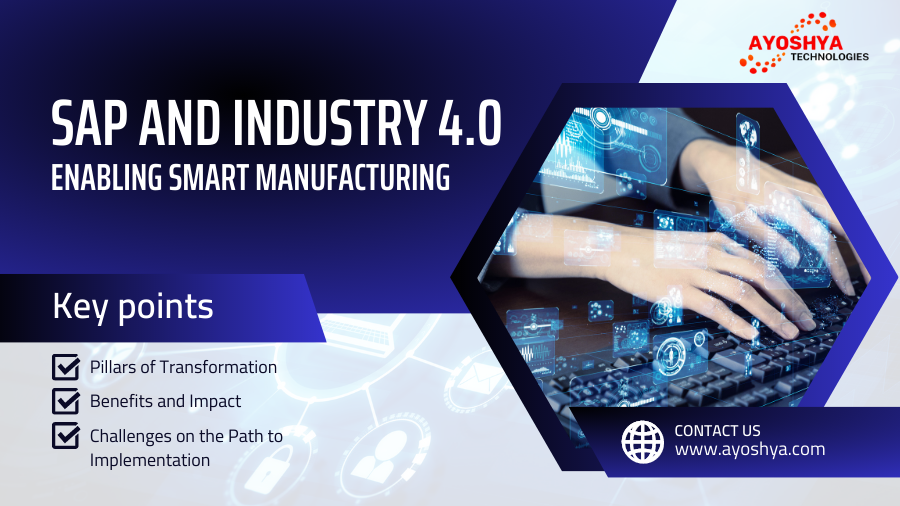What is the relationship between SAP and Industry 4.0 ?
In the ever-evolving landscape of technology, the integration of digital advancements into industries has been a driving force behind innovation and growth. One such synergy that has captured the imagination of businesses worldwide is the convergence of SAP and Industry solutions with the principles of Industry 4.0, which focuses on the interconnectedness of devices and systems through the Internet of Things (IoT). This fusion holds the promise of revolutionizing the manufacturing sector, propelling it into an era of unparalleled efficiency, productivity, and intelligence.
Introduction: The Marriage of SAP and Industry 4.0
As the fourth industrial revolution takes center stage, Industry 4.0 emerges as a transformative concept that envisions the integration of automation, data exchange, and real-time insights into manufacturing processes. This synergy aims to create smart factories capable of making informed decisions, optimizing operations, and even predicting maintenance needs.
Understanding Industry 4.0: The Pillars of Transformation
1. Interconnectivity and IoT Integration
At the core of Industry 4.0 lies interconnectivity – the ability of machines, devices, sensors, and people to communicate and share data seamlessly. SAP’s role in this context is paramount. Its robust platform enables the integration of these entities, providing a holistic view of operations, enabling predictive maintenance, and enhancing supply chain management.
2. Data Analytics and Real-time Insights
Industry 4.0 relies on data as its lifeblood. SAP’s advanced analytics tools empower manufacturers to extract actionable insights from massive datasets in real time. By harnessing the power of technologies like artificial intelligence and machine learning, businesses can make data-driven decisions, optimize processes, and innovate with agility.
3. Automation and Robotics
Automation is a cornerstone of Industry 4.0, and SAP solutions provide the orchestration required to achieve it. From streamlining workflows to automating repetitive tasks, SAP’s integration with robotics enhances efficiency, reduces errors, and allows human workers to focus on tasks that require creativity and critical thinking.
4. Smart Supply Chain
A dynamic supply chain is pivotal to modern manufacturing, and SAP’s software solutions optimize every stage of the process. From demand forecasting to inventory management and logistics, SAP ensures that the right resources are available at the right time, minimizing disruptions and enhancing overall productivity.
SAP’s Role in Enabling Industry 4.0: Benefits and Impact
1. Enhanced Visibility and Traceability
SAP’s integration with Industry 4.0 technologies provides manufacturers with unprecedented visibility into their operations. This transparency extends from the shop floor to the boardroom, enabling better decision-making, risk mitigation, and compliance adherence.
2. Predictive Maintenance
The marriage of SAP’s enterprise software with Industry 4.0’s predictive analytics enables businesses to shift from reactive maintenance to predictive models. Machines equipped with sensors can communicate their performance status to SAP systems, which can then forecast maintenance needs, reducing downtime and improving operational efficiency.
3. Agile Production Processes
Industry 4.0 calls for flexible and agile production processes that can swiftly respond to changing demands. SAP solutions facilitate this adaptability by allowing manufacturers to reconfigure production lines, allocate resources efficiently, and optimize production schedules in real time.
Challenges on the Path to Implementation
While the potential benefits of SAP and Industry 4.0 integration are immense, challenges do exist. Complexities related to data security, interoperability, and the need for upskilling the workforce to operate in this new paradigm must be addressed.
Conclusion: A Future of Smart Manufacturing
As the manufacturing landscape evolves, the partnership between SAP and Industry 4.0 emerges as a beacon of transformative potential. By harnessing the power of interconnectivity, data analytics, automation, and agility, businesses can pave the way for a new era of smart manufacturing. This convergence isn’t just about technology; it’s about revolutionizing industries, empowering workers, and achieving sustainable growth.
FAQs on SAP and Industry
1. What is Industry 4.0, and how does it relate to SAP?
Industry 4.0 refers to the fourth industrial revolution characterized by the integration of digital technologies into manufacturing processes. SAP plays a pivotal role by providing the software foundation to enable smart manufacturing through data analytics, interconnectivity, and automation.
2. How does SAP enhance supply chain management in Industry 4.0?
SAP optimizes the supply chain in Industry 4.0 by offering tools for demand forecasting, inventory management, and logistics. This ensures that resources are available when needed, minimizing disruptions and improving overall efficiency.
3. What are the benefits of predictive maintenance enabled by SAP and Industry 4.0?
Predictive maintenance powered by SAP and Industry 4.0 allows businesses to anticipate maintenance needs based on real-time data from sensors. This reduces downtime, enhances operational efficiency, and extends the lifespan of equipment.
4. What challenges might businesses face in implementing SAP and Industry 4.0 integration?
Businesses may encounter challenges related to data security, interoperability of different systems, and the need to upskill the workforce to operate in the new digital manufacturing environment.
5. How does SAP contribute to agile production processes in Industry 4.0?
SAP enables agile production processes in Industry 4.0 by providing tools to reconfigure production lines, allocate resources efficiently, and optimize production schedules in real time, allowing manufacturers to quickly adapt to changing demands.



